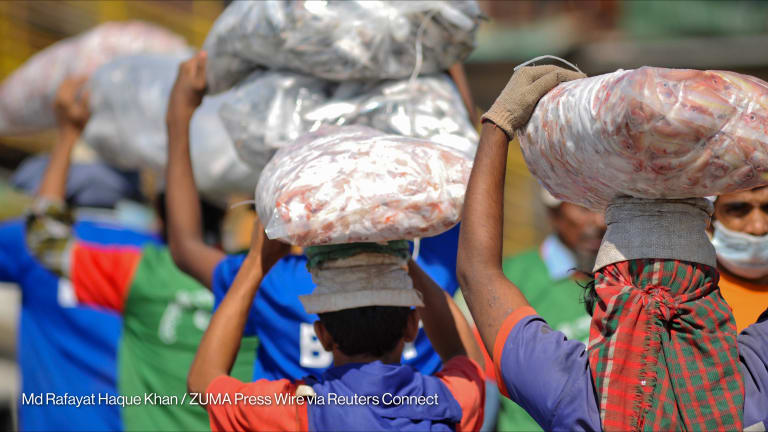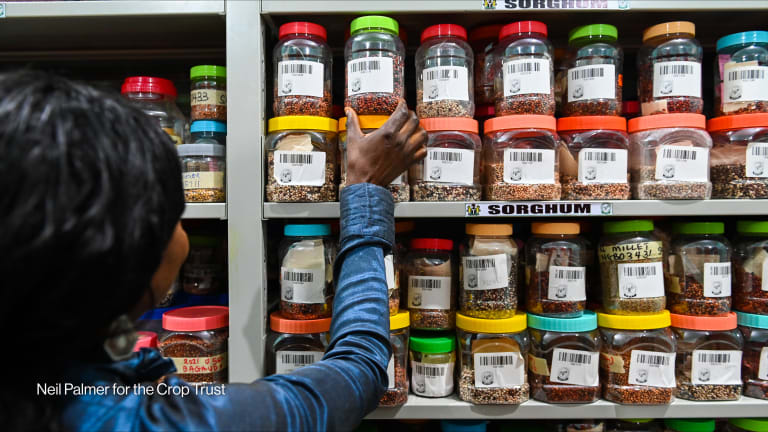
Climate change and COVID-19 have prompted experts to evaluate the use of science and technology in achieving food security among low- and middle-income countries in a sustainable way.
“The pandemic really pushed us in the corner and gave us a chance to fundamentally rethink the way we produce, process, and consume food,” said Ismahane Elouafi, chief scientist at the Food and Agriculture Organization.
The solution, she said, can be found in rapidly advancing technologies and innovation in the agricultural sector.
FAO Director-General Qu Dongyu, also a scientist, has similarly advocated for the uptake of technology to deal with everything from food safety to zoonotic disease and antimicrobial resistance.
Part of our The Future of Food Systems series
Find out how we can make food fair and healthy for all. Join the conversation using the hashtag #FoodSystems and visit our The Future of Food Systems page for more coverage.
Today, drones spray pesticides to prevent locust infestations, record aerial footage for crop assessment, and locate herds of cattle spread out over vast grazing lands. Alternative proteins, such as lab-grown meat, can help reduce agricultural greenhouse gas emissions and resource use. Gene editing for seed improvements can produce more crops and improve nutrition outcomes. Blockchain can ensure fair wages for farmers and encourage more transparency in food systems.
There are as many negative impacts of these technologies as there are positive ones, however. So are technology and science really silver bullets?
Speaking with Devex, Elouafi discussed the future of innovation and the challenges in implementing new technology on the ground to make food production and consumption more effective, equitable, and environmentally sustainable.
This conversation has been edited for length and clarity.
How can technology and innovation tackle rising food insecurity?
Agriculture is not a stand-alone sector. Everything is interconnected. Biodiversity loss feeds into climate change, which feeds into problems of production. We have to recognize that complexity to be able to design a food system that works better for people and prosperity.
Nature is complex, but it's perfect. We need to understand the pathways in nature which are interconnected. If we understand them, we should be able to produce food by mimicking nature.
Thirty years ago, we had no clue what was happening at the genetic level. Many new technologies happened right after we discovered how to read DNA — how to understand the composition of genes, how they are expressed, and how they are transcribed. Now with the new technology on gene editing, this will allow us to go into the gene and change sequences to trigger certain proteins or certain enzymes or certain metabolites. This is a technology that can be a breaking point in history.
Also, when you think about biodiversity, we're talking trillions of cells. Or when you look at the soil, you’ve got trillions of microorganisms. We finally have big data, which gives us the ability to connect the genomic data with the weather data, with the productivity data, with the nutrition data. We also have the ability to understand it, analyze it, and use artificial intelligence to manage it and make it perform better in terms of analysis and intervention. The possibilities are endless.
What challenges do low- and middle-income countries face with the implementation of technology and innovation?
For every problem, I see a solution in science, innovation, and technology. But having the solution does not always allow you to deploy it. You need a conducive environment that allows you to really scale out and scale up.
Some technologies have existed for some time, but they’ve never made it to the ground. The challenge is really the understanding of certain communities or countries about the technologies and the risk around them.
In science, you need the proper design, [and] you need to have enough repetition [and] enough data to analyze it and make sure that it is good. The rigor behind science should be applied when we talk about new technologies. After that, it has to go through policy and regulation [processes], and that's where science, policy, and society interface. We need better mechanisms to really bridge between these three groups, because right now that relationship is a little bit linear rather than [going] two ways.
Unfortunately, most of the innovations that made a difference in the developed world did not make any difference at all in the least-income countries, and it's because it never reached them. In Africa, you look at the whole continent, and only about 7% of agricultural land is irrigated. The reason behind it is infrastructure and affordability. Most of those technologies are way too expensive. That's really where our focus should be.
How do we make these technologies affordable and accessible?
The only way to make it affordable, in my mind, is really to make a manufacturing blockchain. You need to develop the SMEs [small and medium-sized enterprises] so that seeds, fertilizers, and irrigation materials are produced locally or at least regionally. The fact that they import so many of those inputs from the outside makes it very expensive. We need to look at how we could develop an ecosystem, where the different pieces are interconnected, are affordable, and are close to the farmer.
Also, once you develop something, the know-how and the technology has to be transferred to the farmers. So there is a need to look at how we could make sure the knowledge goes to the farmer and how we could help some of the countries to really rebuild or re-imagine their extension services [for transferring this knowledge to the farmer], either through public services or a combination with the private sector.
“The pandemic really pushed us in the corner and gave us a chance to fundamentally rethink the way we produce, process, and consume food.”
—Ismahane Elouafi, chief scientist, Food and Agriculture Organization.There have been proposals for a new international platform for food systems science. Is another research body necessary?
There are always ways to improve things. It took us forever to really recognize that nutrition and agriculture are interconnected. For me, the Committee on World Food Security is a very strong mechanism that exists, but the CFS is heavy, like all very old organizations or committees. But still, it has all the parties in it: civil society, government, private sector.
What we need to do is strive to make an easier way to come to an agreement on how technologies could be deployed or, for example, how could we eradicate malnutrition by this number in this region.
So that’s where, during the [United Nations’ planned] Food Systems Summit, we have to find solutions. And those solutions have to be deployed the right way. [We need to] focus on the efficiency, the inclusiveness, the resilience, and sustainability of the food system and make sure that, by the end, we are providing a healthy diet for all. So for me, it doesn't matter what the tool is. We have to agree on the target.
Update, June 23, 2021: This article has been updated to clarify that the conversion has been edited for length and clarity.
Visit the Future of Food Systems series for more coverage on food and nutrition — and importantly, how we can make food fair and healthy for all. You can join the conversation using the hashtag #FoodSystems.









